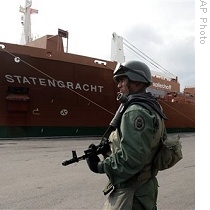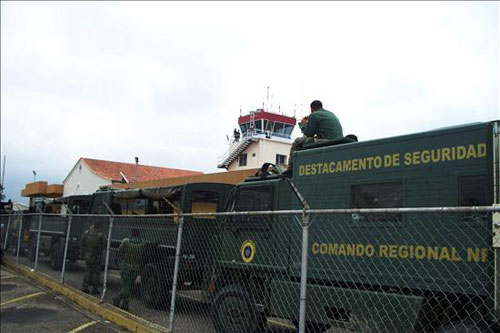Venezuelan Military Takes Control of Transportation Hubs

In another move to further consolidate power around Hugo Chavez, the Venezuelan military took control of major airport and maritime hubs and occupied facilities that were previously controlled by the states. Some of the states are governed by the opposition. The decree signed last week by Hugo Chavez also transferred control over major highways.
Late last week the government had ordered the arrest of opposition leader Manuel Rosales, mayor of Maracaibo, Venezuela's second-largest city where the largest port is located.
Rosales will be tried on charges of "illegal enrichment" in Caracas, not in his hometown, where thousands of his supporters staged a huge rally during the weekend.
Today the military presence increased at La Fría and San Antonio airports. Noticias 24 reports that when announcing the takeover, Chavez declared that "we have begun the reversal process over everything that meant the dismemberment of national unity, the territory, and sovereignty, because prior governments fractured the country into pieces." Of course he had to blame the US, "the empire's divide-and-conquer strategy, carried by the pettiyankees" (Chavez's word for Venezuelans who favor the US) "that expropriated the people" has plummeted "with this reversal, which is part of the unification process which will strengthen the nation."
Also today, Chavez ordered the creation of a state company to manage the country's seaports and another for its airports. The new companies, called the Bolivariana de Puertos and Bolivariana de Aeropuertos and which will be part of the Infrastructure and Housing Ministry, "have to work under socialist guidelines and seek the development of the regions in which their respective seaports and airports operate," as decreed by Chavez. The decrees will become law once they are published in the Official Gazette.
Critics say the move will limit the powers of state governors, who previously collected revenue from tariffs they imposed at airports and seaports under their administration.Later in the day, while speaking to a meeting of regional officers, Chavez expressed the goal of his Bolivarian revolution achieving the same solidity as the Cuban revolution: "Our revolution must some day reach that level of maturity, of consolidation, but this requires a gigantic effort, both individually and collectively."




